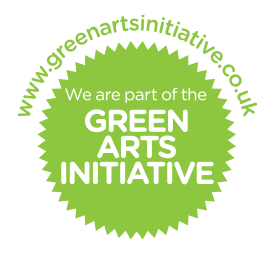Climate Change Response Plan, Carbon Reduction and Beyond
Each year, using a robust methodology developed with our fellow festivals, we measure and report on our direct carbon emissions. This has helped us to understand our footprint and, over the last two years, reduce emissions that we have direct control over, such as travel and waste, by 5%.
In order to progress towards net zero by 2030, we will take action in the following ways:
Operations
- Reduce operations carbon emissions from office energy use by 40% by 2030, reducing by roughly 3.5% per year.
- Work with our building landlords to identify ways to use greener energy providers, and accurately monitor energy usage.
- Continue to work with our landlords to identify ways to reduce heating demand, and to actively understand our gas consumption.
- Continue to offer only meat-free catering from Edinburgh-based companies for Festival events, using biodegradable plates and cups.
Travel
- Reduce travel-related emissions for staff, volunteers and artists by 40% by 2030, reducing by roughly 3.5% per year.
- Use trains, rather than flights, for domestic journeys taken by all staff and participating artists. When flights cannot be avoided, we aim to book economy class in newer aircraft1 and offset emissions via a Scotland-based reputable source2.
- Avoid any long-haul flights for staff or artists during each alternate festival year from 2021, except in exceptional circumstances.
- Switch to an electric-only taxi contract as soon as this is available, while lobbying our current contracted taxi provider.
- Use shipping by sea rather than air freight when shipping artworks and production items.
Materials
- Reduce printed material carbon emissions from by 69% by 2030, to be reduced by around 5.4% per year (to be reviewed annually).
- Reduce the weight of Festival guides and maps by providing more information online, and redesigning materials to use fewer resources.
- Review our supply chain and procurement of goods and services to ensure that, by 2024, we are only using environmentally responsible suppliers and materials.
- Work with technicians to ensure end-of-Festival materials are re-used or passed on as much as possible, reducing our waste by 10% each year.
- Provide guidelines for participating artists on the Festival’s Environmental Policy, encouraging use of sustainable materials and practices where possible. From 2022, we have included this policy and advice in contracts with artists and freelance technicians.
Advocacy
- Advocate good environmental practices and policies across all areas of our work3.
- Progress opportunities for environmental and climate justice-related programming.
Carbon Offsetting
- Use carbon compensation schemes ethically alongside our main priority of reducing emissions, to reach net zero. We will work to ensure any carbon sequestration providers we use are ethical, Scotland-based, and follow best practice.
——————
1 Where emissions are lower per flight.
2 Approved by the Festivals Edinburgh Environmental Sustainability Working Group.
3 We will work in collaboration with cultural and environmental partners to find joint approaches and innovative solutions to the challenges of climate change.
Emissions Reporting
2019—2020 16,500Kg CO2e – baseline emissions calculated with support from Beyond Green
2023—2024 9,030Kg CO2e
Rationale for International Working
We are conscious of the environmental impact of international working. As such, we want to ensure that we only work with international partners or artists when there is a clear and specific rationale for this work. We are currently developing a specific policy, in line with our environmental policy, but we aim for this to include that:
- The work we travel for must provide unique opportunities for learning and development for the EAF team.
- The work will positively position and develop Scottish artists internationally.
- The project will develop relationships with artists and places most negatively affected by the climate crisis, so EAF can contribute towards climate justice in the arts.
- The international artists or partners have a clear commitment to climate justice principles and environmental sustainability and make significant and reasonable efforts to minimise their impact on the environment.
- International working is used for research and to inform plans for future iterations of EAF. This includes getting to know a certain Festival programme or partner; exploring the potential of a future international presenting or commissioning collaboration, and learning from different styles of festivals and their strategies.
- EAF is able to contribute to international sectoral knowledge by attending and participating in conferences, panels or thinking groups abroad.
- The work will help EAF to think about or develop ties to a specific region or territory.
- The travel is supported financially by an artist or partner and any opportunity to undertake this travel will be used to expand upon those trips for the benefit of staff members, collaborators, partners, artists, and the wider organisation.

